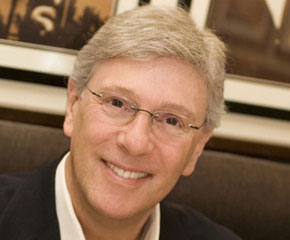Melman, 65, opened his first restaurant with late partner Jerry Orzoff in 1971, and today operates Lettuce Entertain You Enterprises Inc., a company with more than 30 concepts and over 70 restaurants nationwide ranging from simple pubs to white-tablecloth venues.
Since the inception of the still-existent R.J. Grunts, Melman has grown his privately-held management company into a team of nearly 50 partners, each directly investing in the concepts they lay claim to. Each concept leans on Lettuce for back office support, including human resources, payroll and marketing, among other services.
Q: There’s such saturation in the restaurant industry. Where can you make money?
A: “I think you can make money in any segment if you think it through and if you run it properly. I’ve had steakhouses with high food costs do extremely well. I think you have to know your business today more than ever. You really have to be very clear about who you want to attract and what you want to accomplish. Before we do a restaurant, there’s just tons of goals that I set up for myself that give me a sense of whether we’re going in the right direction or not.”
Q: What is that process like?
A: “It’s something that I’ve done for years and years. It’s not enough to say I want to open an Italian restaurant. There might be a hundred questions that I ask myself, and goals that I set up within that framework. When you know exactly where you want to go the pathway is easy. When you don’t know where you want to go is when it gets hard.”
Q: What are the hot categories right now?
A: “Asian has been hot, it seems, on a number of levels. We just opened up something called Wow Bao and it’s really humming. We’re sort of moulding it as time goes on and changing it. We’ve got a whole new category for it. We’re calling it quick quality. The quality in terms of what we’re doing is very important for this concept. I don’t care if the costs are a little higher.”
Q: Quality is indeed important. Americans are becoming more aware of what they eat. How do you cope with increased scrutiny on ingredients and sourcing?
A: “Restaurateurs, like all business people, have to be flexible. I think that’s one of the key things today. The word is changing much more quickly than it used to. I think that you just need to be flexible and open to change and realise that you need to constantly reconnect with the customer.”
Q: How long do you give a concept before you pull the plug?
A: ‘We’re in a position, after all these years, where we’re a very healthy company financially. So I can afford to be a little more stubborn that a lot of people. And there have been a number of concepts that we played with and played with and played with and finally they hit. I think part of my weakness is that I view restaurants as children. I don’t give up on them very easily.”
Q: Can you give an example of one of your failures?
A: “I remember a restaurant that to me was a failure but it wound up making money and it was called Bones. We opened 28 or 29 years ago and everything I did didn’t work. And it was really discouraging for me. We built a whole pit with mesquite wood and we were cooking fish over mesquite woo and I remember a friend of mine said, ‘Can’t you figure out why fish isn’t working? The place is called Bones. It doesn’t exactly go with fish.’ I miss a lot. I think that I usually miss on every restaurant about 30 percent of the time. But we fix it in the first couple of weeks. That’s why I’m always present when we do something new and I’m constantly changing and fixing.”
Q: You can tell pretty quickly if something is amiss?
A: “When I watch the people, when I hear them talk, when I interview them, when I see what comes back, I know it real quickly. I’m not a defensive type person. I don’t hear them saying, ‘Rich Melman, you’re bad.’ I hear them say, ‘The meatloaf is bad.’ Well, I’ll fix it. I’ll just change it. So we go to these practice parties and we watch people.”
Q: Where do you get most of your inspiration for new concepts?
A: “I think I’m a good listener and I’m constantly looking at what people are eating, constantly looking at medical breakthroughs. I have idea files at home. And I keep little notes on ideas that I have, and sometimes they’ll sit three, four, five year, six years, ten years before I do it. Part of my job is just thinking of new ways of doing things and I do that constantly.”

